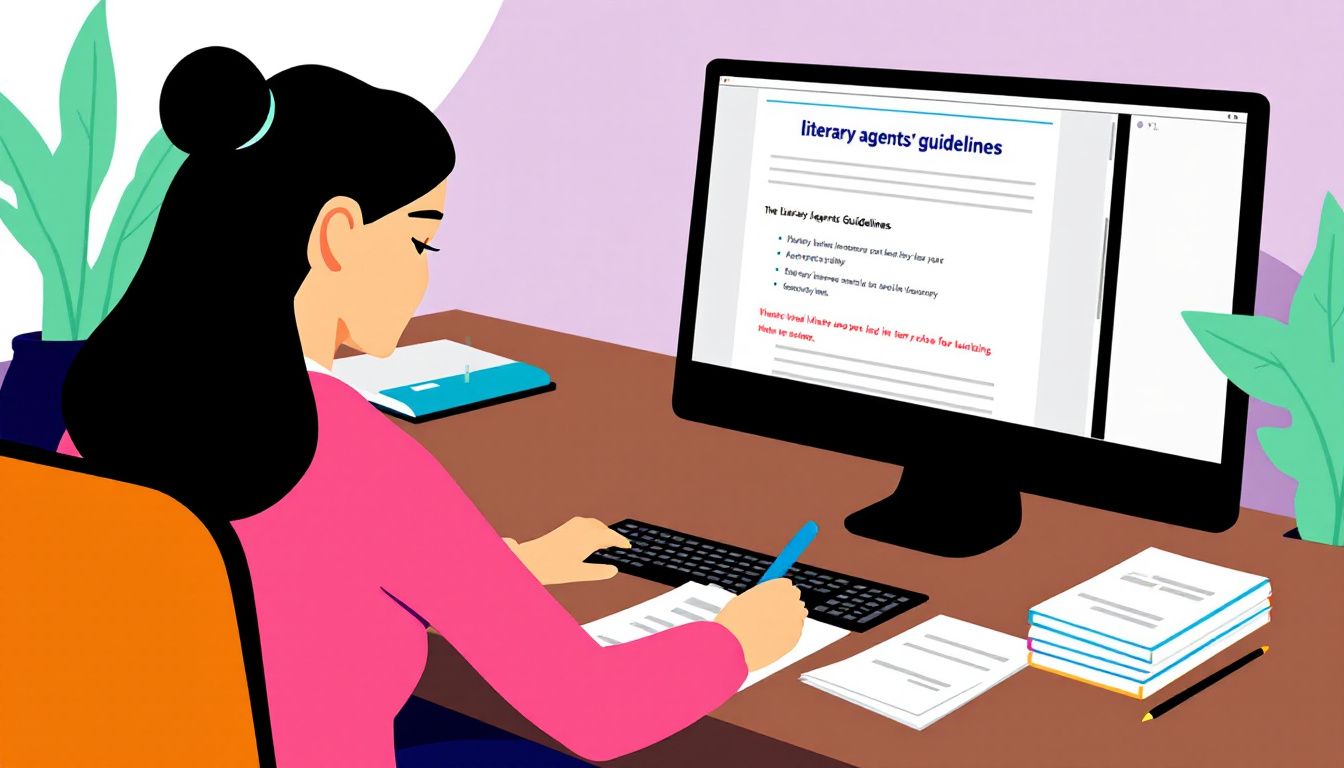Master Query Letters: 7 Steps to Success

Master Query Letters: 7 Steps to Success
Did you know that only 1 in 6,000 writers achieve traditional publication? In a world where competition is fierce, crafting a compelling query letter for literary agents is critical to stand out from the crowd. A well-written query letter can be your golden ticket to capturing the attention of literary agents and getting a foot in the door of the publishing world. This is where "Master Query Letters: 7 Steps to Success" comes in. This comprehensive guide provides step-by-step instructions on writing an effective query letter that can make all the difference in your publishing journey. By following these proven techniques, you'll learn the art of presenting your manuscript in a way that resonates with agents, enhancing your chances of success. Whether you're a seasoned writer or just starting out, mastering the nuances of a literary agent query is crucial, and this guide is here to show you how.
Understand Literary Agents' Expectations
When writing a query letter for literary agents, understanding their expectations is pivotal. Literary agents receive hundreds, if not thousands, of query letters every year, and they are looking for specific elements that align with their preferences and the needs of the publishing industry. Your query letter is your first impression, and it needs to be compelling enough to stand out.
Knowing what agents are looking for is crucial. Most agents seek a query letter that is concise, professional, and clearly communicates the essence of your book. According to a survey conducted by Writer's Digest, 75% of agents prefer a query letter to be no more than one page, which underscores the importance of brevity and clarity. Highlighting your unique voice and the book's hook can significantly increase your chances of capturing an agent's interest.
Researching agent preferences and submission guidelines is another critical step. Each literary agent has distinct tastes and requirements, often listed on their agency's website. Adhering to these guidelines shows that you respect their time and understand the industry. The Manuscript Wishlist website is a valuable resource where agents list the types of books they are currently interested in representing. By tailoring your query to align with a specific agent's preferences, you demonstrate that you've done your homework.
Learning from successful authors and agents can provide invaluable insights. For instance, bestselling author John Grisham emphasizes the need for a strong opening hook in your query letter, while agent Kristin Nelson advises writers to focus on the book's plot and character development in the pitch. These tips can be the difference between a query letter that gets noticed and one that gets lost in the pile.
In summary, understanding what literary agents expect, diligently researching their preferences, and incorporating advice from seasoned professionals can transform your query letter into a powerful tool for securing representation.

Crafting the Perfect Hook
When writing a query letter for literary agents, crafting the perfect hook in your opening line is crucial. This initial sentence is your opportunity to captivate the agent's interest and compel them to read further. A captivating opening line should be intriguing, concise, and reflective of your manuscript's tone and theme. Think of it as a movie trailer—just a glimpse, yet powerful enough to spark curiosity.
Consider this example of an effective hook: "In a world where emotions can be traded like currency, a young empath discovers that love isn't always a fair bargain." This sentence sets up the novel's unique premise and hints at the protagonist's journey, leaving the reader wanting more. Another successful hook might be: "When a small-town librarian stumbles upon a hidden letter, she uncovers a century-old secret that could change everything." Both examples entice the reader with a compelling scenario and a sense of mystery.
Avoid common mistakes that can dampen your introduction's impact. One frequent error is starting with mundane details, such as the protagonist's name or age, without context. Instead, focus on what makes your story unique. Another pitfall is using overly complex language or jargon which might confuse rather than engage. Keep it simple yet evocative.
Statistics show that literary agents receive hundreds of queries weekly. Therefore, a strong hook is not just an asset but a necessity in making your query letter stand out. Remember, your goal is to make the agent eager to learn more about your manuscript. By honing your opening line with clarity and creativity, you lay the foundation for a successful literary agent query. If you're uncertain about your hook's effectiveness, tools like Hemingway Editor can help refine your sentence for maximum impact and readability.
Summarize Your Manuscript Concisely
Summarizing your manuscript concisely is a crucial skill when crafting a query letter for literary agents. A well-written summary can capture an agent's attention and increase your chances of getting a request for your full manuscript. Here are some techniques to help you achieve this balance of detail and brevity.
First, focus on the core elements of your story: the main character, the central conflict, and the stakes involved. By honing in on these aspects, you can provide a clear and engaging snapshot of your manuscript in just a few sentences. Consider this example: "In a dystopian future, 16-year-old Emma must navigate a world where emotions are forbidden, risking everything to protect her family and rekindle humanity's lost spirit." This summary highlights the protagonist, setting, and conflict succinctly.
Another technique is to use vivid language and active voice, which can make your summary more compelling. Avoid overloading your paragraph with subplots or minor characters, as these can dilute the impact of your main narrative. Instead, aim to evoke the essence of your story, leaving the agent intrigued and wanting more.
Balancing detail with brevity can be challenging, but tools like ManuscriptReport.com can help streamline the process. This service offers comprehensive book reports, including concise manuscript descriptions, in about 10 minutes. By using the summary feature, authors can quickly generate polished summaries that capture the key elements of their work. This not only saves time but also ensures that your query letter is professionally presented, giving you an edge in the competitive literary market.
Remember, a concise, engaging summary is your manuscript's introduction to potential agents. By mastering this element of your query letter, you set the stage for a successful submission.
Highlight Your Unique Selling Points
When crafting a query letter for literary agents, one of the most effective strategies is to highlight your book's unique selling points. Identifying what makes your book stand out is crucial. Is it your fresh take on a popular genre, your distinctive voice, or perhaps a compelling theme that resonates with current societal issues? Pinpoint these elements and clearly articulate them in your query letter.
Incorporating comparable titles is another powerful way to communicate your book's uniqueness. These are books that share similarities with yours but also showcase how your work is different. Mentioning comparable titles gives agents a frame of reference and helps them quickly understand where your book fits in the market and how it stands apart. For instance, if your novel is a thriller with a psychological twist, you might compare it to bestsellers like "Gone Girl" or "The Girl on the Train," but emphasize your unique plot or character development.
To streamline this process, consider leveraging tools like ManuscriptReport.com. This platform offers a feature that can identify comparable titles, helping you craft a more compelling pitch. By using ManuscriptReport.com, you can quickly generate a list of comparable books and tailor your query to highlight the distinctive elements of your work. This not only saves you time but also enhances your query by providing agents with a clear picture of your book's target audience and market potential.
Finally, don't forget to clearly define your target audience. Knowing who your book is for can help literary agents envision how they might market it. Whether it's young adults, historical fiction enthusiasts, or sci-fi lovers, specifying your audience is another layer of detail that can make your query letter stand out. By combining these elements effectively, your query letter can capture the attention of literary agents and increase your chances of success.

Include a Professional Bio
When crafting a query letter for literary agents, including a professional bio is crucial. This brief yet impactful section should encapsulate who you are as a writer, offering agents a snapshot of your credentials and background. Aim to keep this section concise—typically no more than 2-3 sentences—while highlighting your most relevant achievements.
Start by mentioning any previous publications, writing awards, or notable accomplishments related to your writing career. If you've been published in reputable journals or have written a book that garnered attention, include these details. For example, "My short stories have appeared in The New Yorker and Atlantic Monthly, and I received the Pushcart Prize in 2021." Such accolades not only establish credibility but also demonstrate your commitment and experience in the literary world.
If you're a debut author without formal publishing credits, focus on any relevant experience or education that underlines your proficiency in writing. Mention writing workshops, degrees in creative writing, or any professional experiences that may enrich your storytelling. For instance, "With a Master's in Creative Writing from Columbia University, I draw on my background in journalism to create compelling narratives."
It's equally important to link to your author platform or previous work, if applicable. Provide links to your personal website or blog, where agents can explore more about your work and writing style. This digital footprint can be particularly beneficial, as it reflects your ability to engage with an audience and maintain an online presence. Avoid overwhelming agents with excessive links or unrelated achievements—focus on the most compelling aspects of your career.
By carefully curating the information in your bio, you can create a powerful narrative that complements the rest of your query letter, enticing agents to learn more about you and your work.
Frequently Asked Questions
How long should a query letter be?
A query letter for literary agents should typically be one page long, containing around 300-400 words. This concise format ensures that agents can quickly grasp the essence of your manuscript. According to industry experts, keeping your query succinct yet engaging increases the likelihood of catching an agent's attention. Focus on delivering a compelling hook, a brief synopsis of your work, and a short author bio. Avoid unnecessary details to maintain clarity and impact. If you're seeking guidance, writing tools like QueryTracker can help you streamline your query letter process, ensuring it meets industry standards and enhances your chance of success.
What is the best way to address an agent in a query letter?
When crafting a query letter for literary agents, addressing the agent by name is crucial. Personalized greetings show that you have researched the agent and their preferences, which can significantly increase your chances of making a positive impression. Avoid generic greetings like "Dear Agent" or "To Whom It May Concern," as these can come off as impersonal and decrease your query's effectiveness. According to a survey by QueryTracker, personalized queries have up to a 30% higher response rate. Utilize resources like the Literary Agent Directory to find accurate agent names and tailor your query letter accordingly for optimal results.
Should I include my book's word count in the query letter?
Yes, you should include your book's word count in the query letter, typically near the end. This information is crucial for literary agents to assess if your manuscript fits their preferred project scope. For instance, a debut novel often ranges between 80,000 and 100,000 words, a benchmark many agents use to evaluate submissions. Including the word count helps agents quickly determine whether your book aligns with market standards and their specific needs. Such details can streamline the process, making it easier for agents to decide if your manuscript is worth considering for representation.